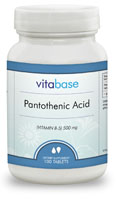| Pantothenic acid is a water-soluble vitamin that belongs to the B group of vitamins. Vitamin B5 is essential for human growth, reproduction and many normal bodily processes. Vitamin B5 is also important for the production of haemoglobin, which is the special substance inside red blood cells that transports oxygen to all the tissues in the body. Like the other B vitamins,
pantothenic acid plays a role in energy production. It is also essential in the production of fatty acids and important hormones, and helps maintain the health of muscles and the digestive system. Pantothenic acid is an essential component of coenzyme A, which functions in the metabolism of fatty acids, triglycerides and cholesterol. Pantothenic acid plays a role in the synthesis of adrenocortical hormones (cortisone and its intermediates), hemoglobin and myoglobin (a chemical in the muscles similar to hemoglobin in the blood).
Pantothenic acid deficiency is extremely rare in any but the most impoverished societies and is generally associated with severe nutritional deficiencies such as Kwashiorkor or marasmus. Fatigue is probably the earliest and most common symptom of pantothenic acid deficiency, though it is an unlikely vitamin deficiency because of the availability of B5 in many foods, plus the fact that it is also produced by our intestinal bacteria. Symptoms of pantothenic acid deficiency, which has occurred under conditions of severe malnutrition, include numbness in the toes and painful burning in the feet (melalgia).
Vitamin B5 deficiencies are rare but may occur in people with alcoholism, malabsorption conditions, or serious illnesses. Pantothenic acid deficiencies may occur in people with alcoholism but are generally believed to be rare. Pantothenic acid is usually present in oral supplements as calcium pantothenate. Pantethine is the most stable active form of pantothenic acid. A diet high in refined and processed foods or a reduction or destruction of intestinal flora, most commonly by antibiotic use, can lead to a vitamin B5 deficiency. Teenagers are more likely to experience a deficiency, because their diets often include high amounts of "fast foods" sugars, and refined flours (all low in B vitamins). And the problem may be compounded because the acne often associated with this type of diet is commonly treated with tetracycline antibiotics, which reduce the intestinal bacteria and thereby the production of pantothenic acid in the colon.
Many foods contain vitamin B5, therefore a deficiency of this nutrient is rare. The Greek word "Panthos," from which its name is derived means "everywhere." Vitamin B5 is available from a very large range of food sources. Symptoms of a vitamin B5 deficiency may include fatigue, insomnia, depression, irritability, vomiting, stomach pains, burning feet, and upper respiratory infections. Vitamin B5 deficiency causes depression, personality changes, heart problems, increased risk of infections, fatigue, abdominal pains, sleep disturbances, numbness and altered sensation in the arms and legs, muscle weakness, cramps, increased sensitivity to insulin (the hormone that lowers blood glucose levels), decreased blood cholesterol levels and decreased potassium levels in the body. |
